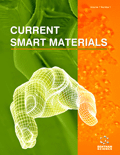Abstract
Background: Symmetrically substituted pentacenes have been traditionally used as semiconductors for solution-processed p-channel Organic Field Effect Transistors (OFETs). The aims of this paper are to introduce asymmetrically substituted pentacenes in the active layer and to examine the impact of the polyaromaticity of the pendant groups on the device characteristics.
Methods: Research and online content related to asymmetrically substituted pentacenes is reviewed, the synthesis of the different pentacenes is described and the procedure used to introduce these semiconductors in devices is detailed. Comparison with a reference material is provided.
Results: Extension of the polyaromaticity of the pendant group of pentacene greatly contributes to enhance the device performances. Impact of the pendant group on the morphology of the active layer is evidenced by the roughness decreasing with the increase of aromatic ring in the substituent.
Conclusion: We demonstrate the extension of the π-conjugation of the aromatic end-group to drastically impact both ON/OFF ratio and charge carrier mobilities, mainly due to various degree of crystal formation characteristics in the film. Best results were obtained with the most extended one, namely the anthracene moiety which showed a mobility comparable to that of the benchmark TIPS-pentacene with OFETs that used hexamethyldisilazane as the gate dielectric passivation layer.
Keywords: Mobility, OFET, organic materials, semiconductor, solution-process, TIPS-pentacene.
Graphical Abstract
 11
11




